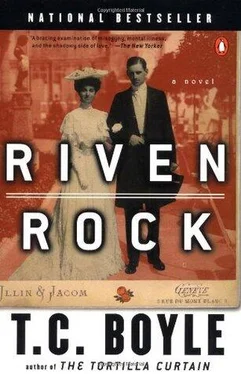T. Boyle - Riven Rock
Здесь есть возможность читать онлайн «T. Boyle - Riven Rock» весь текст электронной книги совершенно бесплатно (целиком полную версию без сокращений). В некоторых случаях можно слушать аудио, скачать через торрент в формате fb2 и присутствует краткое содержание. Год выпуска: 1999, Издательство: Penguin Books, Жанр: Современная проза, на английском языке. Описание произведения, (предисловие) а так же отзывы посетителей доступны на портале библиотеки ЛибКат.
- Название:Riven Rock
- Автор:
- Издательство:Penguin Books
- Жанр:
- Год:1999
- ISBN:нет данных
- Рейтинг книги:5 / 5. Голосов: 1
-
Избранное:Добавить в избранное
- Отзывы:
-
Ваша оценка:
- 100
- 1
- 2
- 3
- 4
- 5
Riven Rock: краткое содержание, описание и аннотация
Предлагаем к чтению аннотацию, описание, краткое содержание или предисловие (зависит от того, что написал сам автор книги «Riven Rock»). Если вы не нашли необходимую информацию о книге — напишите в комментариях, мы постараемся отыскать её.
Riven Rock — читать онлайн бесплатно полную книгу (весь текст) целиком
Ниже представлен текст книги, разбитый по страницам. Система сохранения места последней прочитанной страницы, позволяет с удобством читать онлайн бесплатно книгу «Riven Rock», без необходимости каждый раз заново искать на чём Вы остановились. Поставьте закладку, и сможете в любой момент перейти на страницу, на которой закончили чтение.
Интервал:
Закладка:
The first day at Prangins all she did was sleep, and when Madame Fleury, the housekeeper, poked her stricken face in the door inquiring if madame wanted anything to eat, Katherine told her to go away. At dusk, she thought she ought to get up, but she didn‘t — she just lay there, sunk into the pillows, holding herself very still. She watched the darkness congeal in the corners and fan out over the floor, and then she was asleep again, the night a void, black and silent, no wind, not a murmur from the lake. In the morning, she woke to the sound of birds and the shifting light playing off the water, the floating aqueous light of her girlhood when she would spend half the day rowing out into the lake till she was beyond the sight of shore, and for the first thirty seconds she didn’t think of Stanley. She was at Prangins, behind the walls, behind the gate, secure and safe and with nothing to do but read and walk and row and all the time in the world to do it, and what was so bad about that? Suddenly she was hungry, and she realized she hadn’t eaten since she’d got off the train from Paris, her stomach in turmoil, in revolt, but growling now in the most placable and ordinary way. She rang for the housekeeper and had breakfast sent up, a good Swiss breakfast of fresh eggs and cheeses and wafer-thin slices of Black Forest ham with rolls hot from the oven and fresh cream for her coffee, and she ate it all in a kind of dream, sitting at the window and gazing out over the lake.
She forced herself to get dressed and to greet the servants, most of whom she hadn’t seen in nearly a year, and then she went down to the lake and took one of the rowboats out. There was a breeze with a scent of snow blowing off the mountains, but the sun was warm and she relished the feel of the oars in her hands, the spume, the rocking of the boat, each stroke taking her farther from all the complexities of her life, from Stanley and wedding gowns and arborio rice by the bushel — and the specter of babies, that too. What had he shouted over the clamor of the crowd and the mindless blast of the ship’s horn? I can have children!
That was sweet. It was. And she did want a baby, not only for Stanley’s sake and her mother’s and to honor the memory of her father and all the Dexters before him, but for the most personal and selfish of reasons: it was her privilege and her will. As a woman. As an independent woman of independent means. For twenty-nine years she’d developed her mind and body, and to what end? To make her choice, her own free choice, without regard to convention or expectation or the demands of the world of men, to be married or not to be married, to have a child or not, to study the biological sciences at the Institute or scale Mount Everest, and she’d chosen Stanley, nobody else. Strapping, shy, artistic Stanley, athletic Stanley, manly Stanley. He was her biological destiny, her husband, her mate, and they would come together in the dark and he would impregnate her — that was the way it was supposed to be, that was what she’d wanted. She thought about that, tugging at the oars and feeling her blood quicken, savoring the flex and release of the muscles in her shoulders and back, and pictured herself in a white nightdress in a field of white flowers, pregnant and glowing like the Madonna of the Rose Bush. It was frightening, beyond her control — beautiful and heady and frightening.
But Stanley was in Chicago, where he belonged and where he had to stay until he got a grip on himself. She’d been gentle with him — he had to understand that she needed to get away by herself, and though the engagement was officially broken, the ring returned and the caterers and the florists and their minions called off, there was hope still, if he would only give her time. Gentle, but firm. She didn’t tell him when she was leaving or where she meant to go, but only that he shouldn’t attempt to follow her, no matter what. He had to respect that. And if he did, and if he improved his outlook and settled his nerves and she had a chance to calm herself too, then maybe, just maybe, there was hope for them yet.
By noon — or what she took to be noon from the position of the sun stuck in the clouds overhead — she was hungry again, and that was a good sign. She didn’t have anything with her, not so much as an apple or pear, and she let herself drift a while, cradled by the waves, the smell of the wind and the water playing on her senses till the hunger was a physical ache, and then she made for an inn on the Geneva shore and sat in a vast dining room and had lunch over a newspaper and a pot of tea while a punctilious waiter with drooping mustaches fussed over her. She had the soup, a salad, roast duck with potatoes and vegetable, and she lingered over dessert, reading a paragraph at a time from the paper spread out before her and then lifting her head to gaze out on the lake in reverie. When finally she climbed back into the rowboat with the aid of an overly solicitous concierge and the frowning waiter (Wouldn’t madame prefer a taxi? One of the boys could return the boat in the morning—“Cela ne pose pas de problème”), the sky had closed up like a fist and a light drizzle hung suspended in the air. She thanked them for their concern, but really, she said, she’d prefer the exercise. Clucking and protesting, the concierge held an umbrella out over her head as she settled herself on the thwart, and then watched in disbelief as she shoved off nimbly and swung the bow around into the vague drifting belly of the mist. The visibility was poor, and she might have been in real danger, but she stuck close to shore and rowed until she was no longer aware she was rowing, until there was nothing left in the universe but her arms and the boat and the lake.
Two weeks passed. She saw no one. She swam, walked, rowed, read French novels, helped the cook plan the menu and even took up the needlepoint her mother had abandoned the previous fall, and she wasn’t bored, not yet, but getting healthier and steadier and calmer as each day fell into the next. She was sitting at breakfast one morning, absorbed in a Maupassant tale — the one about the plump little courtesan and the coach full of hypocrites-when Madame Fleury informed her that there was a man at the gate inquiring after her.
“A man?”
“Oui, Madame. He says he knows you. He won’t go away.”
And what was this, a little spark? Hope, fear, anger: it couldn’t be. “Did he give you his card? A name?”
The housekeeper was a plain, angular woman in her forties, an adept at driving all expression from her face and suppressing any hint of emotion in her voice; the house could be in flames and she would knock quietly at the door to ask if madame would be needing anything. Her mouth tightened just perceptibly round her words: “He refused, madame. But we haven’t opened the gate, and Jean Claude is keeping an eye on him.”
Katherine set down her teacup. Her heart was pounding. “Well, is he from the village then? Is he a tradesman, a gentleman, a goatherd?”
The housekeeper gave a shrug, and it was a Gallic shrug, respectful only to the degree that was necessary, while managing at the same time to convey not only impatience but a deep disillusionment with the question. She pursed her lips. “Jean Claude says he has a motorcar.”
And then she was up from the table, no time to think, no time to manage her hair or grab a hat or worry about what she was wearing, and down the stone steps and out into the circular drive, the gravel skewing awkwardly beneath her feet, all the way to the gate, breathless, sure it was a false alarm, some Oxford boy on his Grand Tour come to inquire about the history and architecture of the place, a motoring enthusiast experiencing mechanical difficulties, a friend of her mother‘s, some busybody from the village… but she was wrong. Because it was Stanley, Stanley standing there at the gate like some apparition exhaled from the earth and given form in that instant. His hands were gripping the bars on either side of him as if to hold him upright, his shoulders were slumped, his head bowed penitentially.
Читать дальшеИнтервал:
Закладка:
Похожие книги на «Riven Rock»
Представляем Вашему вниманию похожие книги на «Riven Rock» списком для выбора. Мы отобрали схожую по названию и смыслу литературу в надежде предоставить читателям больше вариантов отыскать новые, интересные, ещё непрочитанные произведения.
Обсуждение, отзывы о книге «Riven Rock» и просто собственные мнения читателей. Оставьте ваши комментарии, напишите, что Вы думаете о произведении, его смысле или главных героях. Укажите что конкретно понравилось, а что нет, и почему Вы так считаете.












